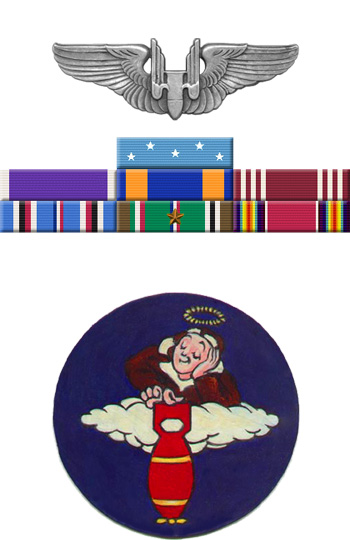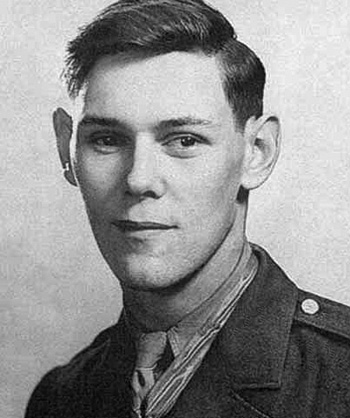Forrest Vosler was born on July 29, 1923, in Lyndonville, New York. He enlisted in the U.S. Army Air Forces on October 8, 1942, and was trained as an airborne radio operator at the Radio Operators and Mechanics School at Scott Air Field, Illinois, followed by aircraft gunners school, and B-17 Flying Fortress training. Sgt Vosler deployed to England in October 1943, and was assigned as a B-17 radio operator with the 358th Bomb Squadron of the 303rd Bomb Group. He was badly injured during a bombing mission on December 20, 1943, for which he would later receive the Medal of Honor. TSgt Vosler was honorably discharged from the Army Air Forces on October 12, 1944, and later spent 30 years working for the Veterans Administration. He died on February 17, 1992, and was buried at Arlington National Cemetery in Arlington, Virginia. Vosler Academic Development Center on Keesler AFB in Biloxi, MS, is named in his Honor.
His Medal of Honor Citation reads
For conspicuous gallantry in action against the enemy above and beyond the call of duty while serving as a radio operator-air gunner on a heavy bombardment aircraft in a mission over Bremen, Germany, on 20 December 1943. After bombing the target, the aircraft in which T/Sgt. Vosler was serving was severely damaged by antiaircraft fire, forced out of formation, and immediately subjected to repeated vicious attacks by enemy fighters. Early in the engagement a 20-mm. cannon shell exploded in the radio compartment, painfully wounding T/Sgt. Vosler in the legs and thighs. At about the same time a direct hit on the tail of the ship seriously wounded the tail gunner and rendered the tail guns inoperative. Realizing the great need for firepower in protecting the vulnerable tail of the ship, T/Sgt. Vosler, with grim determination, kept up a steady stream of deadly fire. Shortly thereafter another 20-mm. enemy shell exploded, wounding T/Sgt. Vosler in the chest and about the face. Pieces of metal lodged in both eyes, impairing his vision to such an extent that he could only distinguish blurred shapes. Displaying remarkable tenacity and courage, he kept firing his guns and declined to take first-aid treatment. The radio equipment had been rendered inoperative during the battle, and when the pilot announced that he would have to ditch, although unable to see and working entirely by touch, T/Sgt. Vosler finally got the set operating and sent out distress signals despite several lapses into unconsciousness. When the ship ditched, T/Sgt. Vosler managed to get out on the wing by himself and hold the wounded tail gunner from slipping off until the other crewmembers could help them into the dinghy. T/Sgt. Vosler's actions on this occasion were an inspiration to all serving with him. The extraordinary courage, coolness, and skill he displayed in the face of great odds, when handicapped by injuries that would have incapacitated the average crewmember, were outstanding.
|



